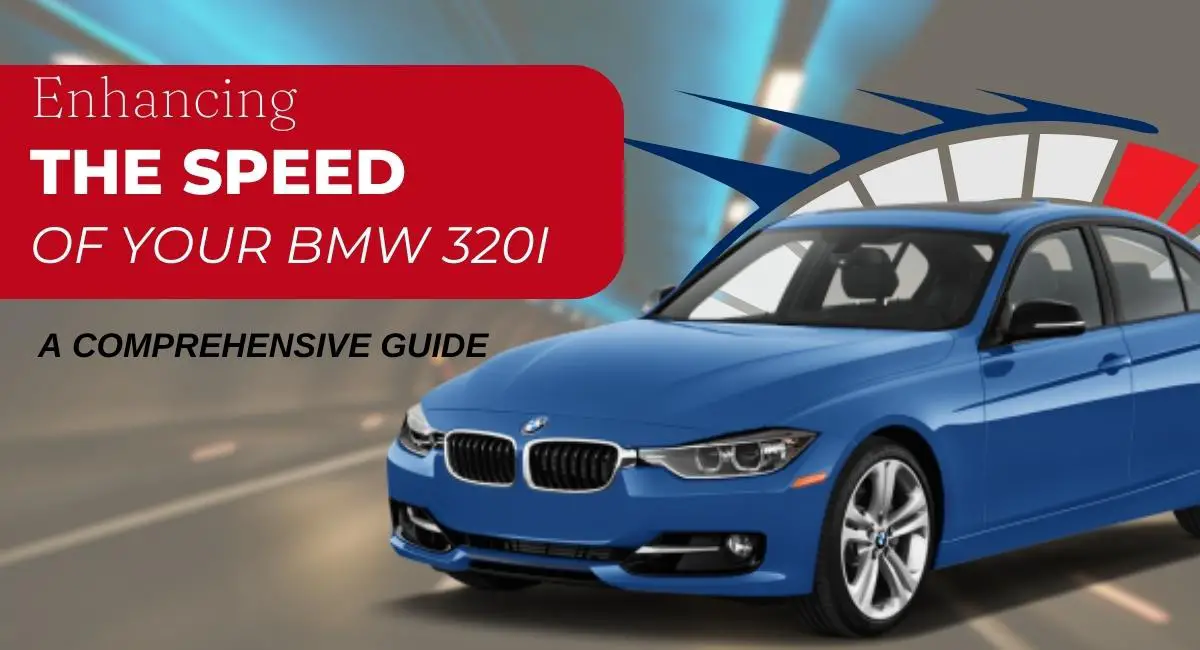The BMW 320i, an epitome of luxury blended with performance, has long been admired for its smooth ride, responsive handling, and sophisticated design. As one of the pillars of BMW’s iconic 3 Series, it exudes elegance, all while offering a robust performance that enthusiasts and everyday drivers alike can appreciate.
But even with its impressive standard features, the quest for more power, higher speed, and improved performance often leads many BMW 320i owners to consider modifications and upgrades. Embarking on the journey of enhancing your BMW 320i can not only transform your driving experience but also deepen your understanding and appreciation of the intricate mechanisms that make up your vehicle.
However, this task can only be daunting with a clear roadmap to guide you. That’s where this comprehensive guide comes into play. From detailed discussions on the BMW 320i’s engine, performance upgrades, and mods to expert tips on tuning, we aim to provide an in-depth view of how to make your BMW 320i faster.
Understanding the BMW 320i Engine
Delving into the performance of any car requires a thorough understanding of its engine, the heart of the vehicle. In the case of the BMW 320i engine, the standard engine is typically a 2.0-liter, four-cylinder TwinPower Turbo. This engine is part of BMW’s modular engine family, known as B-series engines, which enhance efficiency, improve performance, and reduce emissions.
This engine is one of the most impressive features of this engine. Despite the name, it doesn’t mean the engine uses two turbochargers. Instead, it combines several technologies to ensure optimal power output and fuel efficiency.
The BMW 320i’s 2.0-liter engine can deliver around 180 horsepower and 200 lb-ft of torque. While these numbers might seem modest compared to high-performance models, they still provide the BMW 320i with excellent acceleration capabilities and smooth power delivery, making for a comfortable and agile drive. Despite being slightly less robust than other engines, it still ensures a reliable and satisfying performance.

How to Make BMW 320i Faster
A car’s speed identification is by its power-to-weight ratio – the higher the ratio, the faster the car. Likewise, horsepower and torque greatly influence acceleration. Another often overlooked factor is the vehicle’s aerodynamics and the type of tires fitted; better aerodynamics can improve speed and handling.
BMW 320i Performance Upgrades
Taking the performance of your BMW 320i to the next level requires strategic performance upgrades. These modifications can boost power, improve handling, and offer a more responsive driving experience. Here are some notable upgrades to consider:
Engine Tuning
Upgrading the software of your Engine Control Unit (ECU), also known as chip tuning, can significantly boost engine performance. The standard ECU settings are conservative and aimed at catering to a broad range of driving conditions. Customizing these settings can enhance fuel combustion, improving both torque and horsepower.
Turbocharger/Supercharger Upgrade
Given that the BMW 320i uses a turbocharged engine, a larger, more efficient turbocharger or supercharger can increase power output. Remember, a professional should modify this as it is complex and requires tuning afterward.
Exhaust System Upgrade
Upgrading the exhaust system to a high-performance variant can improve the exhaust gas flow, reducing back pressure and increasing power. Look for systems designed to work with the 320i’s engine specifications to achieve optimal results.
Air Intake System Upgrade
Replacing the standard air intake system with a high-performance cold air intake system can increase the amount of air available for combustion, providing an instant boost in engine power and efficiency.
For instance, a cold air intake kit lets your BMW engine inhale more freely and purely than before, enabling it to operate at its maximum capacity. This kit, equipped with an approved carbon-free filter, is legally acceptable for street use in all US states and beyond. The installation process is straightforward, with no modifications to the vehicle type required.
Suspension Upgrade
A suspension upgrade in a BMW 320i is a modification to the car’s suspension system, which connects the vehicle to its wheels. The suspension system plays a critical role in how a car handles on the road, impacting ride comfort, handling, and safety. It absorbs the impact from road irregularities and keeps the tires in contact with the road surface for better control.
In a performance context, a suspension upgrade typically aims to improve the car’s handling characteristics, making it more responsive, stable, and enjoyable to drive, especially at high speeds or when cornering. While this upgrade might not directly increase the vehicle’s speed or power, it significantly enhances the driving experience, particularly when other performance modifications have been made.
There are various components of the suspension system for upgrading in a BMW 320i:
- Shock Absorbers and Struts: Performance-grade shock absorbers and struts can better handle the stresses of high-speed driving and provide more precise control.
- Springs: Performance springs can lower the vehicle’s center of gravity, reducing body roll and improving handling. Lowered springs can also give the car a more aggressive look.
- Anti-roll Bars: Also known as sway bars, these components help reduce body roll when cornering, keeping the car stable and responsive.
- Bushings: Upgrading to polyurethane bushings can provide more rigidity than standard rubber bushings, leading to increased stability and responsiveness.
- Coilovers: Coilovers replace the separate components of shocks and springs with an integrated unit, offering adjustable ride height and often better performance.
Brake System Upgrade
A brake system upgrade on your BMW 320i primarily enhances your vehicle’s braking performance and safety, particularly when other modifications have increased the vehicle’s speed and power.
Upgrading the brake system may not make your car faster, but handling increased speeds is critical. High-performance brakes can provide shorter stopping distances, better heat dissipation, and more consistent performance, especially during aggressive driving or on-track days. Some of the key components you can upgrade in the braking system are brake pads, brake discs/rotors, brake calipers, brake lines, and brake fluid.
Weight Reduction
Reducing the weight of your BMW 320i will improve the power-to-weight ratio, enhancing acceleration and speed. Weight reduction is achievable through simple steps such as removing unnecessary items from the vehicle or more complex modifications like replacing certain parts with lighter alternatives.
Tire Upgrade
High-performance tires can provide better grip and control, which is crucial for handling the increased power and speed of your BMW 320i mods.
Remember, each of these upgrades can have implications for the vehicle’s warranty, fuel economy, and legal status, so it’s crucial to consider these factors before making any modifications. Furthermore, professional installation and tuning of BMW 320i are necessary to ensure optimal performance and safety.
BMW 320i Mods: Exterior and Interior Enhancements
Exterior modifications, installing aerodynamic additions like spoilers, diffusers, and air dams, can also enhance performance by reducing air resistance (drag) and increasing downforce.
Weight reduction modifications can include using carbon fiber body parts and installing lightweight seats. Lighter wheels can also improve speed and handling, while tires with better grip can contribute to quicker acceleration and better control. Safety modifications, like roll cages and harnesses, are essential for those planning to race their modified BMW 320i.
Tuning BMW 320i
Professional tuning is crucial to maximize the potential of these upgrades. ECU tuning or remapping, for instance, optimizes the electronic parameters within the ECU, leading to improved engine performance. Suspension tuning, on the other hand, helps achieve the ideal balance between comfort and handling.
While tuning can substantially enhance performance, there are several considerations to remember. Reliability is crucial, as over-tuning can lead to mechanical failures. It is essential to comply with local vehicle modification laws and ensure safety is not compromised.
Potential Risks and Precautions when Modifying and Tuning BMW 320i
Modifying and tuning your BMW 320i can significantly enhance performance and speed. However, these enhancements come with potential risks and implications that every car owner should understand before proceeding. Furthermore, vehicle modifications may have legal consequences in some regions, so it’s vital to familiarize yourself with local regulations.
Warranty Implications: Modifying your BMW 320i could void the manufacturer’s warranty. If your vehicle is still under warranty, you should consider how important it is to maintain that coverage. Some modifications may not impact the warranty, but others, especially those that alter the engine or drivetrain, typically do.
Legal Implications: Different jurisdictions have different laws and regulations regarding vehicle modifications. For instance, excessive noise, changes to the emission system, or modifications that impact safety could be illegal. Always ensure you’re aware of and compliant with local laws before proceeding with any changes.
Insurance Implications: Modifications can impact your car insurance. Some insurers may increase premiums or refuse to cover a modified vehicle. Before changing your car, check with your insurance provider to understand how your coverage might be affected.
Increased Maintenance: Performance modifications often strain a vehicle, leading to increased wear and tear. Consequently, you may need to service and maintain your BMW 320i more frequently. It could include more regular oil changes, brake checks, and tire replacements.
Safety: Increasing your car’s performance could also increase the risk of accidents if not managed correctly. Modifications like improved brakes and suspension can help manage increased performance, but driving responsibly and within your limits is equally important.
Resale Value: Depending on the modifications, the resale value of your car could be affected. While some improvements may increase value, others may decrease it, particularly if they’re uncommon or significantly alter the vehicle’s original specifications.
Professional Installation and Tuning: Improper installation or tuning of modifications can lead to poor performance and potential damage. Always ensure experienced professionals make changes and the car is properly tuned to handle the new upgrades.
Conclusion
Making a BMW 320i faster involves a combination of performance upgrades, modifications, and tuning. If done correctly, it can result in a truly amazing driving machine. It’s essential to seek professional assistance and ensure changes are done responsibly and in line with safety and legal guidelines.
